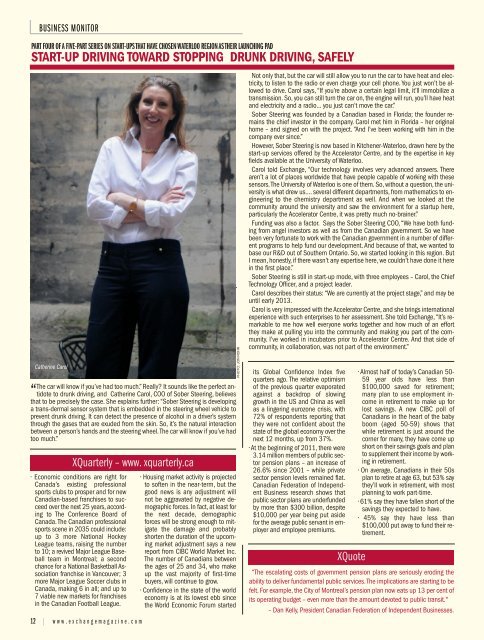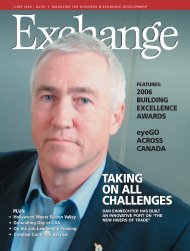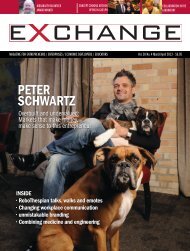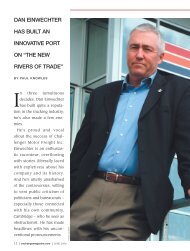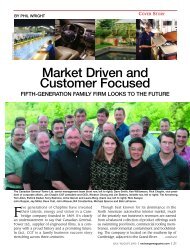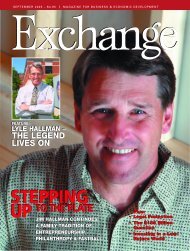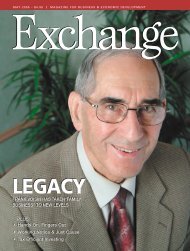BUSINESS MONITORPART FOUR OF A FIVE-PART SERIES ON START-UPS THAT HAVE CHOSEN WATERLOO REGION AS THEIR LAUNCHING PADSTART-UP DRIVING TOWARD STOPPING DRUNK DRIVING, SAFELYCatherine Carol“The car will know if you’ve had too much.” Really? It sounds like the perfect antidoteto drunk driving, and Catherine Carol, COO of Sober Steering, believesthat to be precisely the case. She explains further: “Sober Steering is developinga trans-dermal sensor system that is embedded in the steering wheel vehicle toprevent drunk driving. It can detect the presence of alcohol in a driver’s systemthrough the gases that are exuded from the skin. So, it’s the natural interactionbetween a person’s hands and the steering wheel.The car will know if you’ve hadtoo much.”XQuarterly – www. xquarterly.ca• Economic conditions are right forCanada’s existing professionalsports clubs to prosper and for newCanadian-based franchises to succeedover the next 25 years, accordingto The Conference Board ofCanada.The Canadian professionalsports scene in 2035 could include:up to 3 more National HockeyLeague teams, raising the numberto 10; a revived Major League Baseballteam in Montreal; a secondchance for a National Basketball Associationfranchise in Vancouver; 3more Major League Soccer clubs inCanada, making 6 in all; and up to7 viable new markets for franchisesin the Canadian Football League.12 | w w w . e x c h a n g e m a g a z i n e . c o m• Housing market activity is projectedto soften in the near-term, but thegood news is any adjustment willnot be aggravated by negative demographicforces. In fact, at least forthe next decade, demographicforces will be strong enough to mitigatethe damage and probablyshorten the duration of the upcomingmarket adjustment says a newreport from CIBC World Market Inc.The number of Canadians betweenthe ages of 25 and 34, who makeup the vast majority of first-timebuyers, will continue to grow.• Confidence in the state of the worldeconomy is at its lowest ebb sincethe World Economic Forum startedPHOTO: JON ROHRNot only that, but the car will still allow you to run the car to have heat and electricity,to listen to the radio or even charge your cell phone. You just won’t be allowedto drive. Carol says, “If you’re above a certain legal limit, it’ll immobilize atransmission. So, you can still turn the car on, the engine will run, you’ll have heatand electricity and a radio... you just can’t move the car.”Sober Steering was founded by a Canadian based in Florida; the founder remainsthe chief investor in the company. Carol met him in Florida – her originalhome – and signed on with the project. “And I’ve been working with him in thecompany ever since.”However, Sober Steering is now based in Kitchener-Waterloo, drawn here by thestart-up services offered by the Accelerator Centre, and by the expertise in keyfields available at the University of Waterloo.Carol told <strong>Exchange</strong>, “Our technology involves very advanced answers. Therearen’t a lot of places worldwide that have people capable of working with thesesensors.The University of Waterloo is one of them. So, without a question, the universityis what drew us.... several different departments, from mathematics to engineeringto the chemistry department as well. And when we looked at thecommunity around the university and saw the environment for a startup here,particularly the Accelerator Centre, it was pretty much no-brainer.”Funding was also a factor. Says the Sober Steering COO, “We have both fundingfrom angel investors as well as from the Canadian government. So we havebeen very fortunate to work with the Canadian government in a number of differentprograms to help fund our development. And because of that, we wanted tobase our R&D out of Southern Ontario. So, we started looking in this region. ButI mean, honestly, if there wasn’t any expertise here, we couldn’t have done it herein the first place.”Sober Steering is still in start-up mode, with three employees – Carol, the ChiefTechnology Officer, and a project leader.Carol describes their status: “We are currently at the project stage,” and may beuntil early 2013.Carol is very impressed with the Accelerator Centre, and she brings internationalexperience with such enterprises to her assessment. She told <strong>Exchange</strong>, “It’s remarkableto me how well everyone works together and how much of an effortthey make at pulling you into the community and making you part of the community.I’ve worked in incubators prior to Accelerator Centre. And that side ofcommunity, in collaboration, was not part of the environment.”its Global Confidence Index fivequarters ago. The relative optimismof the previous quarter evaporatedagainst a backdrop of slowinggrowth in the US and China as wellas a lingering eurozone crisis, with72% of respondents reporting thatthey were not confident about thestate of the global economy over thenext 12 months, up from 37%.• At the beginning of 2011, there were3.14 million members of public sectorpension plans – an increase of26.6% since 2001 – while privatesector pension levels remained flat.Canadian Federation of IndependentBusiness research shows thatpublic sector plans are underfundedby more than $300 billion, despite$10,000 per year being put asidefor the average public servant in employerand employee premiums.XQuote• Almost half of today’s Canadian 50-59 year olds have less than$100,000 saved for retirement;many plan to use employment incomein retirement to make up forlost savings. A new CIBC poll ofCanadians in the heart of the babyboom (aged 50-59) shows thatwhile retirement is just around thecorner for many, they have come upshort on their savings goals and planto supplement their income by workingin retirement.• On average, Canadians in their 50splan to retire at age 63, but 53% saythey’ll work in retirement, with mostplanning to work part-time.• 61% say they have fallen short of thesavings they expected to have.• 45% say they have less than$100,000 put away to fund their retirement.“The escalating costs of government pension plans are seriously eroding theability to deliver fundamental public services.The implications are starting to befelt. For example, the City of Montreal’s pension plan now eats up 13 per cent ofits operating budget – even more than the amount devoted to public transit."– Dan Kelly, President Canadian Federation of Independent Businesses.
BUSINESS MONITORSIXTY YEARS AND GOING STRONGThere are not a lot of people around who can remember a time when a Murray’sstore was not in the heart of New Hamburg. That’s because Murray’s Clothing& Footwear is celebrating its 60th anniversary this year – and because an earliergeneration of the Murrayfamily operated a restaurantright next door to thepresent Peel Street propertyfor almost a decadebefore that!Today, Mark Murray,owner and operator ofMurray’s Clothing &Footwear is the third generationof Murrays to runthe family business.Mark's wife Kimberley isalso integral to its success,working in the officeduring the week andMark Murray, owner and operator of Murray’s Clothing &Footwear is the third generation of Murrays to run the familyRural-Urban Partners ProtectWater QualityMark's daughter, Katiealso works in the store.Murray’s was founded in1952, by Mark’s grandparents,Bill and Dora. Theyopened a departmentstore – a popular conceptat the time – which soldboth groceries and clothing.The family traditionwas established when Billand Dora’s sons, Bob andJim, worked for their parents,and then took overmanagement of the businesswhen Bill passedaway, in 1969.Bob concentrated on thegrocery department, whileJim – Mark’s father – ranthe clothing and footwearbusiness. Mark beganbusiness.working at Murray’s in 1980, and at times, today, cannot believe he is already a32-year veteran of the trade.In 1992, the two departments separated, and in 1994 the grocery divisionmoved to a then-new downtown plaza, under the IGA brand.That IGA store is nowPHOTO: JON ROHRa Sobey’s franchise, owned by Bill and Jill Fleming.Murray's Clothing & Footwear remained in the original building on Peel Street,but received extensive renovations at the same time the grocery store moved tothe plaza. The Murrays understood their place in the heritage of the town – theirbuilding pre-dates the Murray’s business by a century – and history was honouredin the renovations., Today, you can see tin ceilings that were uncovered inthe project, historic hardwood floors, and a front facade restored to its earlierglory. The building at 95 Peel Street received a much-deserved Award of Excellencefrom the Waterloo Regional Heritage Foundation.But it is not the historic building, or even commitment to family tradition, thatkeeps Mark coming to work every day. “It’s the people,” he says. Murray’s has alarge and loyal customer base, both from the local community, and from far afield.Clients come on a regular basis from communities in the Niagara Peninsula andthe Greater Toronto Area.They come for the quality, Mark says, and they come for the service they receiveat Murray’s, which is known for men's wear, ladies' wear, footwear and luggage.Mark says he also enjoys “the challenge of maintaining and growing the business,”a unique challenge for a small-town independent, but a challenge thatMurray’s has met for six decades.Mark is not only loyal to his family business, he is also a big fan of his hometown.His volunteer activities include installing the Christmas lights and the flowerbasket – depending on season! – in the retail district. He’s a member of the Boardof Trade, of which his Dad, Jim, is a past-president. He served on the volunteer firedepartment for 28 years, including 13 years as District Fire Chief. He left that positiononly after being elected as a Township of Wilmot Councillor, a position heholds today.Conservation leaders, scientists,farm leaders, fertilizer industry representatives,and provincial officialsgathered to launch a unique ruralurbanpartnership that will protectwater quality in the Grand River Watershedand support the sustainable intensificationof agriculture in theregion. Funded by the Canadian FertilizerInstitute and the Ontario Centresof Excellence Social Innovation Program,the project will create a uniquenetwork or “cluster” to facilitate sharingof Beneficial Management Practiceguidelines associated with the 4R NutrientStewardship Program.ClimateCHECK will lead this partnershipby deploying its Agri-INNOVATIONSsolution that combines Climate-CHECK’s expertise in agriculture andsustainability with its online Collaborasetools to enable stakeholder collaborationand knowledge transfer.“Agri-INNOVATIONS will provide farmersand other stakeholders online accessto pertinent information andexpert networks. Farmers will benefitfrom greater participation in innovativestrategies for implementing BMPs,such as 4R Nutrient Stewardship,which are designed to support farmersand other stakeholders to increasemarket access and sustainable growthin the agriculture sector,” said Tom Baumann,CEO of ClimateCHECK.“It is essentialto enable farmers to effectivelyengage in knowledge transfer and torapidly scale results and share themwith all stakeholders.”Water quality is a vital issue for the39 municipalities and 1 million residentsliving in the Grand River Watershed.Thisregion of Ontario also representssome of the province’s most viableand productive farmland. Landuse and water quality concerns are ashared priority across the Province ofOntario and the global community.The 4R Nutrient Stewardship Programwill support the adoption of BeneficialManagement Practices on farms. The4R concept guides farmers in usingthe Right fertilizer source; at the Rightrate; at the Right time; and in the Rightplace.“There are many advantages for farmersto adopt the 4Rs into their croppingsystems,” said Norman Beug,Chair of the Canadian Fertilizer Institute,the lead Industry Partner for thisproject. “The 4Rs offer a framework tofarmers as they implement BMPs tooptimize fertilizer efficiency, which minimizesnutrient loss and leakage intothe air and water. The 4R approachmaximizes farmer returns for everytonne of fertilizer used and allowsfarmers to quantify their practices toreceive credits for ecological goodsand services.”“I’m excited about the 4R NutrientStewardship Program we are launchingtoday and look forward to buildingan even closer relationship with all ofthe partners as we work toward ourcommon goal of protecting our preciousresources for generations tocome,” said Jane Mitchell, Chair of theGrand River Conservation Authority.Recent research conducted at institutionssuch as the Water Institute atthe University of Waterloo have providednew insights into land use andwater quality. “Long-standing agriculturalpractices are difficult to change.Improved collaboration techniquesshould encourage greater uptake ofBMPs that,over time,enhance crop production,save farmers money and minimizewater quality impacts,” said Dr.David Rudolph at the Water Institute.Ontario Federation of Agriculture VicePresident Keith Currie added,“the OFAis pleased to participate in this programas it complements the workfarmers have initiated through the EnvironmentalFarm Plan.The 4R fertilizationrecommendations integrated withother BMPs will build on the successesof prior work.”“The Region of Waterloo has a longhistory of working with farmers in WaterlooRegion to improve water quality,”stated Ken Seiling, Regional Chair ofthe Regional Municipality of Waterloo.“This project will not only benefit theagricultural community by offering acollaborative framework to establishbest sustainability practices, but alsobenefits the residents in the surroundingmunicipalities serviced by the watershedthrough decreased ground andsurface water contamination and improveddrinking water quality,” saidTania Massa, Director of Programs, OntarioCentres of Excellence, a key funderof the project. “The 4R NutrientStewardship in the Grand River Watershedwill serve as a pilot project thatwill inform future programs of this natureacross the province.”In addition to the Canadian FertilizerInstitute and the Ontario Centres of Excellence,this project is supported byseveral partner organizations including,the Ontario Federation of Agriculture,the Grand River Conservation Authority,the University of Waterloo Water Institute,and the Region of Waterloo.O C T O B E R 2 0 1 2 | 13


